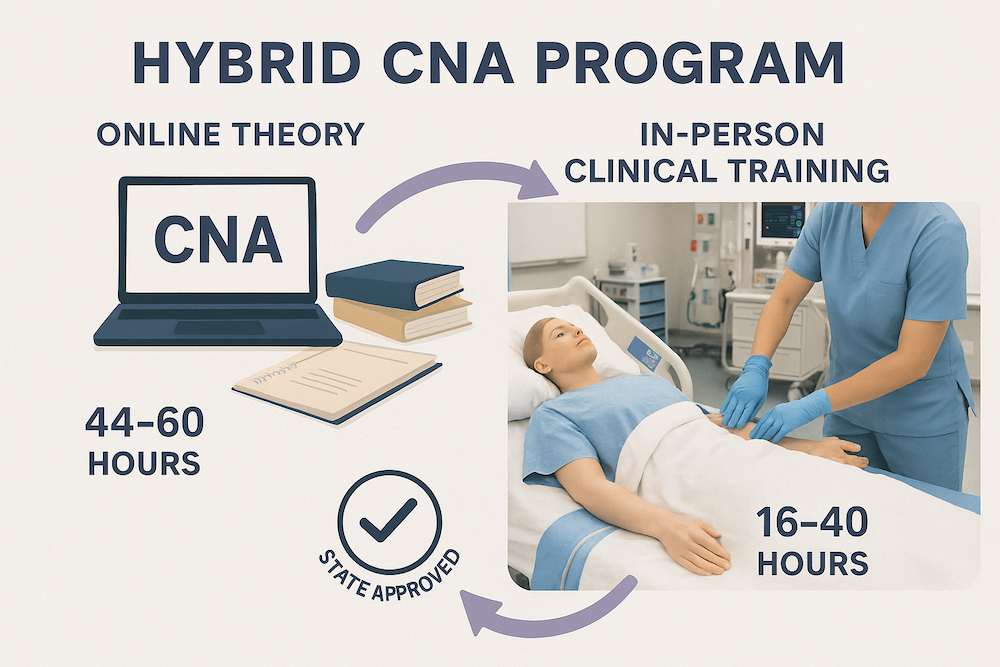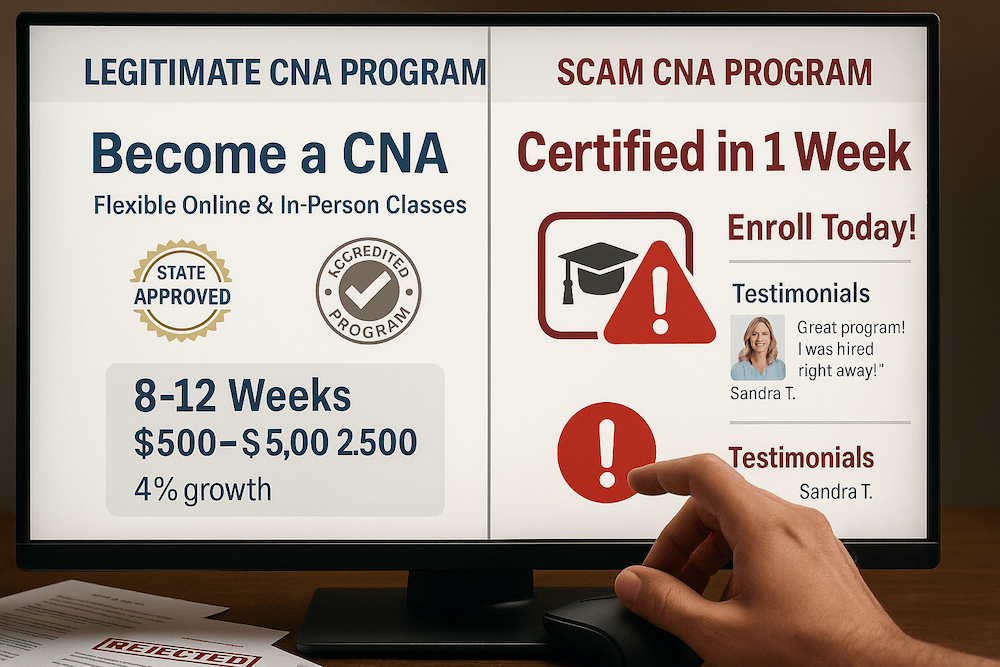
If you’re searching for “online CNA classes,” you’ve probably encountered conflicting information. Some websites promise a full online certification in weeks, while others claim online CNA training doesn’t exist. Here’s the truth: while truly “100% online” CNA classes don’t exist, hybrid programs combining online theory with in-person clinicals are now available in most U.S. states.
Our research team has tracked the significant regulatory changes in 2023-2024, following the pandemic’s impact on healthcare education. We’ve analyzed state-by-state program availability, reviewed outcome data from hybrid programs, and gathered insights from practicing CNAs to give you the complete picture.
As one aspiring CNA shared in the CNA community:
“There are hybrid programs with online classes and in-person labs (and clinicals). If you find anything that claims to be fully online, stay away from it tbh. CNA is like 5% theory and 95% hands-on.”
By the end of this guide, you’ll understand precisely what online CNA training looks like in 2025, how to identify legitimate programs, and whether this flexible format could work for your situation.
The Reality About “Fully Online” CNA Programs
Let’s address the elephant in the room: despite what some websites advertise, you cannot become a certified nursing assistant through a completely online program. This limitation exists for good reason and is rooted in federal law.
The Omnibus Budget Reconciliation Act (OBRA) of 1987 established minimum training requirements for CNAs nationwide, including mandatory hands-on clinical experience. According to these federal requirements, all CNA training programs must include at least 16 hours of direct patient care under supervision in a healthcare facility.
This means you’ll always need in-person clinical training to become certified, regardless of how much online theory you complete. Legitimate CNA programs can offer online classroom instruction for anatomy, infection control, and other theoretical components, but the hands-on skills training must happen in person.
You’ll need to demonstrate competencies like safely transferring patients, taking vital signs, and providing personal care under the direct supervision of qualified instructors. The confusion often stems from the difference between CNA test prep courses (which can be entirely online) and actual CNA training programs (which require state approval and in-person clinical hours).
Programs claiming “100% online certification” are misleading at best. As one Reddit community member warned: “If you find anything that claims to be fully online, stay away from it tbh.” These programs often offer test preparation or continuing education, not the state-approved training needed for initial CNA certification.
The Centers for Medicare & Medicaid Services ended blanket nurse aide waivers on May 11, 2023, reinforcing the importance of proper training standards. This means emergency pandemic measures that temporarily relaxed training requirements are no longer in effect, and complete certification requirements are back in place.
How Hybrid CNA Training Actually Works

Legitimate hybrid CNA programs split the curriculum into online theory instruction and in-person practical training.
Online Theory Component (30-80 hours):
- Anatomy and physiology basics
- Infection control principles
- Patient rights and communication
- Safety procedures and regulations
- Medical terminology and documentation
In-Person Clinical Component (16-40 hours):
- Hands-on skills practice in a lab setting
- Direct patient care in healthcare facilities
- Supervised practice of all required competencies
- Skills evaluation and testing
According to Iowa’s regulations, programs may deliver at least 30 hours of the 75-hour theory curriculum online, while mandating 16 hours of in-person lab practice and 30 hours of in-person clinical experience under approved instructors. Rhode Island permits 80 hours of online didactic instruction out of a 120-hour program, paired with 40 hours of in-person clinical training.
The total program length typically ranges from 4 to 12 weeks, depending on your state’s requirements and the program’s schedule. Technology requirements for the online portion usually include a reliable internet connection, a computer or tablet, and sometimes specific software or learning platforms.
State-by-State Hybrid CNA Program Availability (2025)
Most U.S. states now allow hybrid CNA training programs, a significant shift that occurred primarily in 2023-2024 as states updated their regulations following pandemic-era emergency measures. Our research team has tracked these regulatory changes across the country.
Michigan: Leading Virtual Classroom Innovation
According to the Michigan Department of Licensing and Regulatory Affairs, state-approved CNA programs may conduct “virtual classroom” sessions as an alternative to in-person lectures, announced in 2023.
Michigan’s Requirements:
- Live instructor engagement (real-time student-instructor interaction)
- Thorough documentation of online hours
- 43 hours of classroom instruction must be completed
- All hands-on lab and clinical training remains in-person
Texas: Workforce-Focused Approach
Texas addressed CNA workforce shortages by issuing formal guidelines in 2024 through Provider Letter 2024-07. These guidelines standardized how theory content can be delivered remotely while ensuring students meet competency requirements.
Texas Program Structure:
- 60 hours of online coursework
- 40 hours of in-person lab and clinical practice
- State approval is required for all hybrid programs
California: Structured Oversight Model
California, historically strict about nurse aide training, now maintains an official list of “Approved Online Nurse Assistant Training Providers” through the California Department of Public Health (CDPH).
California’s Approach:
- “Alternative Type II” CNA training designation
- Several weeks of live virtual classes
- Required clinical hours at affiliated long-term care facilities
- Example: California Preparatory College offers 12 weeks of synchronous online lectures (evenings and weekends) plus on-site clinical training
Arkansas: Approved Virtual Instruction
Arkansas updated its nurse aide training rules for 2024 to include “virtual instruction” as an approved method.
Arkansas Requirements:
- Programs must submit a “virtual plan” for state approval
- Online delivery is held to the same standards as in-person classes
- State oversight ensures quality standards
Other Leading States
Iowa’s Balanced Framework:
- 30 hours online theory (of 75 total hours)
- 16 hours in-person lab practice
- 30 hours in-person clinical experience
Rhode Island’s Flexible Model:
- 80 hours online didactic instruction (of 120 total hours)
- 40 hours of in-person clinical training
New York’s Transition Support:
- Approved blended online courses
- Particularly focused on transitioning temporary pandemic-era aides to full CNAs
Not all states have embraced online CNA training at the same pace. Pennsylvania, for instance, maintains strict requirements emphasizing in-person instruction for most components. However, the post-pandemic landscape clearly shifts toward permanent allowances for hybrid CNA education.
To verify whether your state offers hybrid programs, check with your state’s nursing aide certification agency or Department of Health. Each state maintains a list of approved training providers, and many now clearly indicate which programs offer hybrid delivery options.
Are Hybrid CNA Programs Legitimate and Effective?
The short answer is yes, when they’re properly designed and state-approved. Our research reveals that hybrid CNA programs achieve outcomes comparable to traditional in-person programs and perform even better in some cases.
According to the American Red Cross, widely regarded as the old standard in CNA training, blended learning CNA programs report a 90% graduation rate for CNA students and over 80% of graduates passing the state certification exam on the first attempt. These outcomes match or exceed those of traditional programs.
Southwestern College in California provides an even more impressive example. After transitioning their CNA program to online learning platforms during the pandemic, they maintained a nearly 100% pass rate on the state CNA exam. Program administrators credited the digital curriculum with keeping students engaged and helping bridge language gaps without compromising exam preparedness.
According to our analysis of state registry data, no significant gaps in exam pass rates or job performance have been reported between hybrid-trained and classroom-trained CNAs. Both formats produce entry-level CNAs who must pass the same state competency exam (written and practical), creating a level playing field.
The Accrediting Bureau of Health Education Schools (ABHES) requires that any program offered in blended or online mode provide “regular and substantive interaction” between students and faculty. The Accrediting Commission of Career Schools and Colleges (ACCSC) holds hybrid programs to the same outcome benchmarks as traditional ones, including maintaining at least a 70% pass rate on licensure exams.
Healthcare employers widely recognize online CNA certifications, provided the program is state-approved and accredited. According to industry analysis, hiring managers prefer that candidates pass the state exam and be listed on the Nurse Aide Registry. The mode of training is rarely a factor in hiring decisions.
Red Flags to Avoid in Online CNA Programs

While legitimate hybrid programs exist, predatory providers also market misleading “online CNA certification.” Here’s how to protect yourself:
Major Warning Signs:
- Programs claiming “100% online certification” – Impossible under federal law requiring clinical hours
- Unrealistic timelines of 1-2 weeks – Legitimate programs require 4-12 weeks minimum
- No clinical placement guarantee – In-person clinical training is mandatory
- Lack of state approval – Must appear on your state’s approved provider list
- Too-good-to-be-true pricing under $500 – Quality programs typically cost $900-$2,500
- Promises of immediate employment – No program can guarantee job placement
- Vague accreditation claims – Should specify recognized accrediting bodies
As one community member warned:
“How to know if a CNA program is legit? I’m trying to become a CNA but some programs seem sketchy. Do online fast programs, 1-4 weeks, affect your chances of getting hired?”
Always verify program credentials before enrolling. If something seems too easy or too cheap, it probably is.
Best Hybrid CNA Programs: What to Look For
When evaluating hybrid CNA programs, focus on these essential criteria to ensure you’re choosing a legitimate, effective option:
Core Requirements for Quality Programs
State Approval Verification:
- Must appear on your state’s official list of approved training providers
- Contact the state nursing aide certification agency directly to verify
- Don’t rely solely on school claims about approval status
Proper Accreditation:
- Look for ACCSC, ABHES, or regional accreditation
- Programs must provide “regular and substantive interaction” between students and faculty
- Not just access to online materials
Clinical Placement Guarantees:
- Quality programs operate their own clinical sites or have guaranteed partnerships
- Avoid programs expecting you to find your own clinical placement
- Ask about backup plans if placements are delayed
Realistic Cost Structure:
- Legitimate programs typically cost $900-$2,500
- Pricing reflects the real costs of instruction, clinical coordination, and support
- Be wary of significantly higher or lower pricing
Technology and Support Services:
- Robust student support, including technical assistance
- Academic advising and career placement services
- Precise technology requirements and platform training
- Flexible scheduling for adult learners
The best programs accommodate working adults’ needs. As one working parent shared, “It’s online classes from Monday through Friday and in-person clinicals on Saturday and Sunday (77 am 3:30 pm). I would do an in-person class, but with work and everything, I think weekends are the only times I can spare.”
Questions to Ask Before Enrolling
Before committing to any hybrid CNA program, ask these specific questions:
Program Verification:
- “Can you provide the specific state approval number and website where I can verify your program’s status?”
- “What accrediting body oversees your program?”
Clinical Training Details:
- “How do you guarantee clinical placements, and what happens if I can’t complete clinical hours as scheduled?”
- “What healthcare facilities do you partner with for clinical training?”
Technology and Support:
- “What specific technology do I need, and what technical support do you provide?”
- “What student support services are available for online learners?”
Financial and Timeline Information:
- “What is the complete cost, including all fees, materials, and additional charges?”
- “What is the exact timeline, and how flexible are the online and clinical schedules?”
Outcomes Data:
- “What percentage of your graduates pass the state certification exam on their first attempt?”
- “What career services do you provide, and what percentage of graduates find CNA positions?”
These questions will help you distinguish between legitimate programs and predatory providers that may leave you without proper certification or job prospects.
Hybrid vs. Traditional CNA Training: Honest Comparison
To help you make an informed decision, here’s an honest comparison based on our research and community feedback:
Scheduling Flexibility: Hybrid programs clearly win in this category. You can complete theory modules during evenings, weekends, or other convenient times, making them ideal for working adults and parents. Traditional programs typically require set class schedules that may conflict with work or family obligations.
Cost Comparison: Costs are generally comparable between hybrid and traditional programs, typically ranging from $900 to $2,500. However, hybrid programs may save transportation and childcare costs since you’ll spend fewer days on campus.
Performance Outcomes: Our research shows no significant performance gaps between hybrid and traditional CNA training. Both formats produce graduates with equivalent pass rates on state certification exams and similar job placement outcomes. The required hands-on clinical training ensures all CNAs develop the same fundamental skills regardless of how they learned the theory.
Time to Completion: Traditional programs often run 4-8 weeks with fixed schedules, while hybrid programs may take 6-12 weeks depending on how the online and clinical components are structured. The total time investment is similar, but hybrid programs offer more control over pacing.
Learning Style Preferences: Traditional programs work better for students who thrive with in-person instruction and immediate access to instructors. Hybrid programs suit self-directed learners who independently manage online coursework while benefiting from hands-on clinical training.
Who Should Consider Hybrid CNA Training
Hybrid CNA training works particularly well for specific situations:
Ideal Candidates for Hybrid Programs:
- Working Parents with Scheduling Constraints: Study theory content around existing schedules while concentrating clinical training into manageable blocks
- Career Changers Needing Flexibility: Maintain some income while training for a new career
- Rural Students with Limited Local Options: Access quality programs that would otherwise be geographically inaccessible
- Adult Learners Preferring Self-Paced Theory: Review material multiple times and progress at their own pace
When Hybrid May Not Be Right:
- You struggle with self-directed learning
- You need constant instructor support
- You prefer the social interaction of traditional classroom settings
- You have unreliable internet or technology access
Your Next Steps: Finding the Right Program

Ready to explore hybrid CNA training? Here’s your action plan:
Step 1: Verify State Options: Check your state’s nursing aide certification agency website for approved hybrid programs. Look for official lists of approved training providers and note which offer online or hybrid delivery.
Step 2: Confirm Accreditation: Once you identify potential programs, verify their accreditation status through the accrediting body’s official database. Don’t rely solely on the school’s claims.
Step 3: Evaluate Clinical Requirements: Contact programs directly to understand their clinical placement process. Ask about partnerships with local healthcare facilities and what happens if clinical placements are delayed or unavailable.
Step 4: Plan Timeline and Costs: Create a realistic timeline for online theory completion and clinical scheduling—factor in all costs, including tuition, fees, materials, and technology requirements.
Step 5: Decision Framework: Consider your learning style, schedule constraints, career goals, and financial situation. Hybrid programs work well for many students, but are not the right choice for everyone.
Becoming a CNA is just the beginning of your healthcare career journey. Many CNAs use their experience as a stepping stone to LPN or RN programs, which increasingly offer online components for career advancement.
Whether you choose hybrid or traditional training, focus on programs that prepare you for the rewarding but demanding work of caring for patients. The CNAClasses Editorial Team is here to support you through every step of your healthcare career journey.
Frequently Asked Questions
Hybrid CNA programs with online theory and in-person clinicals are legitimate when state-approved and accredited. However, programs claiming “100% online certification” are not legitimate, as federal law requires hands-on clinical training.
Depending on state requirements and program structure, most hybrid CNA programs take 4-12 weeks to complete. The online theory portion can often be completed at your own pace, while clinical training follows a schedule.
Yes, healthcare employers widely accept CNAs trained through state-approved hybrid programs. Employers focus on certification status and competency, not the training format.
Online CNA test prep courses help you study for the certification exam, but don’t qualify you to take it. Only state-approved CNA training programs traditional or hybrid) Provide the education and clinical experience needed for certification.
Legitimate hybrid CNA programs typically cost $900-$2,500, similar to traditional programs. Be wary of programs priced significantly below this range, as they may not provide adequate training or proper certification pathways.
